Spheroidising powder plays a crucial role in various industries, particularly in the production of high-quality metal components. This guide will provide a comprehensive overview of spheroidising powder, including its types, composition, properties, characteristics, applications, specifications, suppliers, pricing details, pros and cons, and much more.
Overview of Spheroidising Powder
Spheroidising powder is primarily used in metallurgy and manufacturing to enhance the properties of metal powders. The process of spheroidisation involves transforming irregularly shaped particles into spherical ones, which improves the flowability, packing density, and mechanical properties of the metal powder. This makes it ideal for applications in additive manufacturing, powder metallurgy, and surface coating.
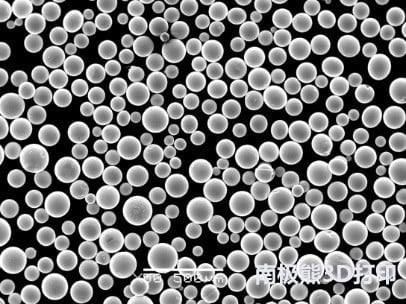
Types of Spheroidising Powder
Different types of spheroidising powders are available, each with unique compositions and characteristics suited to specific applications. Below is a detailed table presenting various metal powder models, their compositions, properties, and characteristics.
| Metal Powder Model | Sáng tác | thuộc tính | Đặc điểm |
|---|---|---|---|
| Titanium Alloy Powder | Ti-6Al-4V | High strength, lightweight, corrosion resistant | Ideal for aerospace applications |
| Stainless Steel Powder | 316L | High corrosion resistance, good mechanical properties | Suitable for medical and food processing industries |
| Aluminum Alloy Powder | AlSi10Mg | Lightweight, high thermal conductivity | Used in automotive and aerospace industries |
| Copper Powder | Đồng | Excellent electrical conductivity, high ductility | Preferred for electrical components |
| Nickel Alloy Powder | Inconel 625 | High strength, oxidation resistant | Common in high-temperature applications |
| Cobalt-Chrome Powder | CoCrMo | High wear resistance, biocompatible | Utilized in medical implants and dental applications |
| Iron Powder | Sắt | Good mechanical properties, cost-effective | Widely used in automotive parts manufacturing |
| Tungsten Carbide Powder | WC | Extremely hard, wear-resistant | Ideal for cutting tools and abrasives |
| Magnesium Alloy Powder | AZ91D | Lightweight, good machinability | Suitable for lightweight structural components |
| Zinc Powder | Zn | Good corrosion resistance, galvanizing properties | Used for galvanizing and battery applications |
Composition of Spheroidising Powder
The composition of spheroidising powder varies depending on the type of metal and the desired properties. Here’s a breakdown of the composition for some common metal powders:
| Metal Powder | Main Elements | Secondary Elements |
|---|---|---|
| Titanium Alloy Powder | Titanium (90%), Aluminum (6%), Vanadium (4%) | – |
| Stainless Steel Powder | Iron (60-70%), Chromium (16-18%), Nickel (10-14%) | Molybdenum (2-3%) |
| Aluminum Alloy Powder | Aluminum (85-90%), Silicon (9-11%), Magnesium (0.5-1%) | – |
| Copper Powder | Copper (99-99.9%) | Oxygen (0.1-0.5%) |
| Nickel Alloy Powder | Nickel (58%), Chromium (20-23%), Molybdenum (8-10%) | Iron (5%) |
| Cobalt-Chrome Powder | Cobalt (60-65%), Chromium (25-30%), Molybdenum (5-7%) | – |
| Iron Powder | Iron (98-99%) | Carbon (0.5-1%) |
| Tungsten Carbide Powder | Tungsten (94-96%), Carbon (4-6%) | – |
| Magnesium Alloy Powder | Magnesium (90-92%), Aluminum (8-10%) | – |
| Zinc Powder | Zinc (99.9%) | – |
Properties and Characteristics of Spheroidising Powder
Understanding the properties and characteristics of spheroidising powder is essential for selecting the right type for specific applications. Below are the key properties and characteristics of some common spheroidising powders:
| Metal Powder | Density (g/cm³) | Melting Point (°C) | Key Characteristics |
|---|---|---|---|
| Titanium Alloy Powder | 4.43 | 1,660 | High strength-to-weight ratio, biocompatible |
| Stainless Steel Powder | 7.9 | 1,400-1,450 | Corrosion resistance, good mechanical strength |
| Aluminum Alloy Powder | 2.7 | 660 | Lightweight, excellent thermal conductivity |
| Copper Powder | 8.96 | 1,083 | High electrical conductivity, ductile |
| Nickel Alloy Powder | 8.44 | 1,350-1,460 | High temperature and corrosion resistance |
| Cobalt-Chrome Powder | 8.3 | 1,335-1,420 | Wear resistance, biocompatibility |
| Iron Powder | 7.87 | 1,538 | Cost-effective, good mechanical properties |
| Tungsten Carbide Powder | 15.63 | 2,870 | Extremely hard, wear-resistant |
| Magnesium Alloy Powder | 1.74 | 650-670 | Lightweight, good machinability |
| Zinc Powder | 7.14 | 419.5 | Kháng ăn mòn tốt |
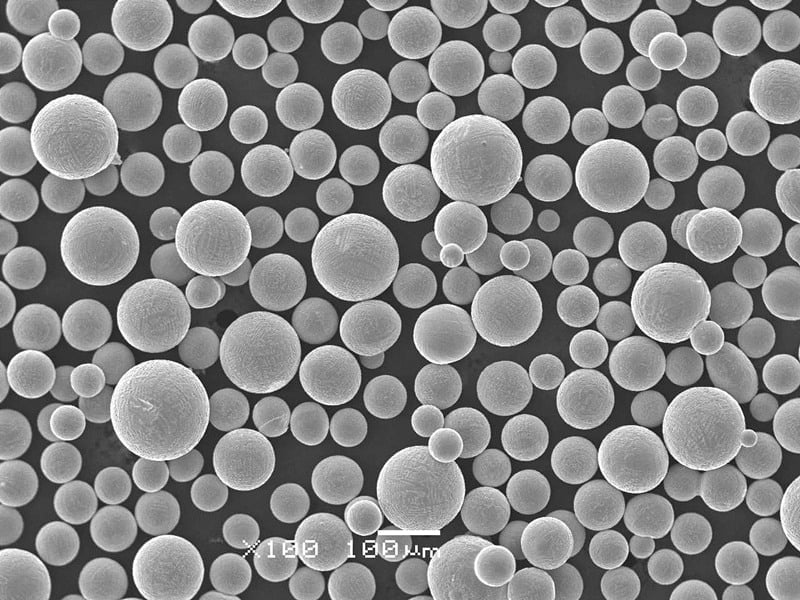
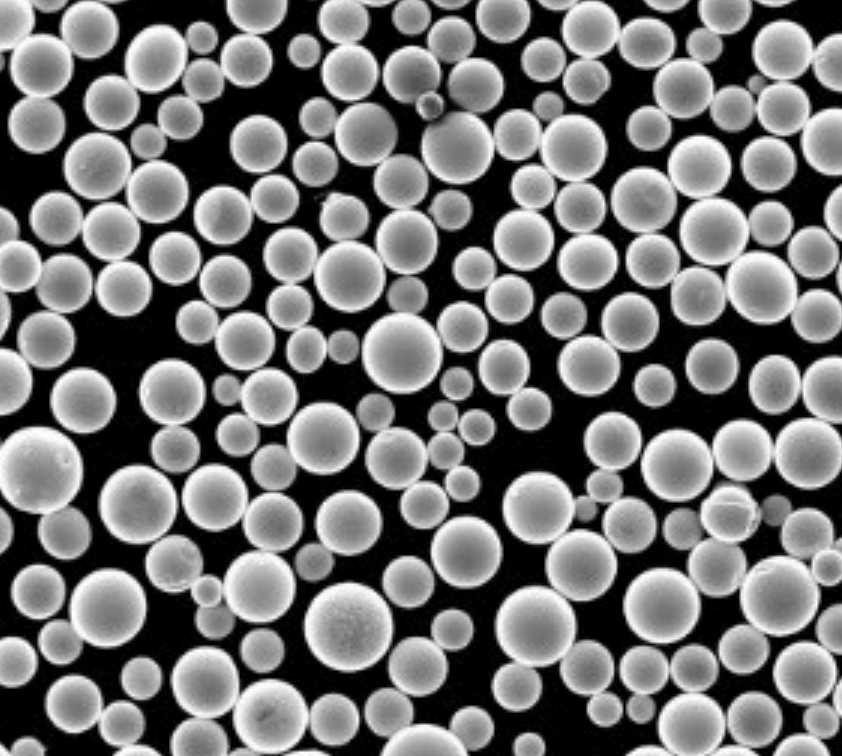

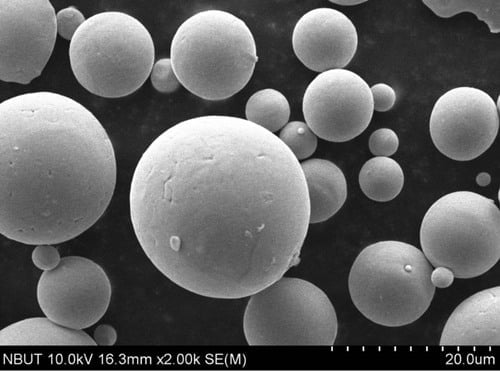
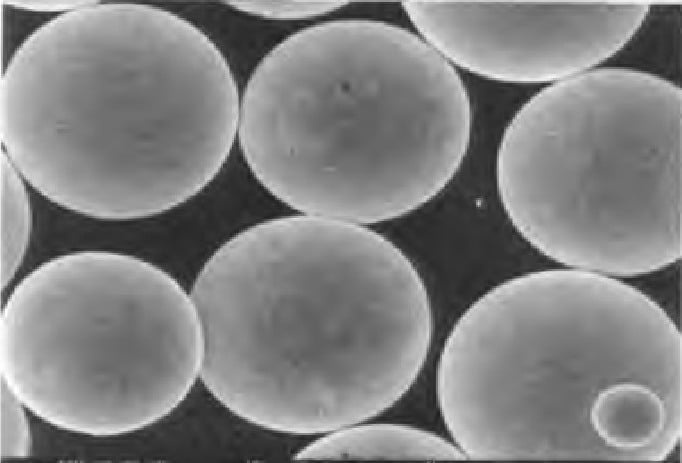
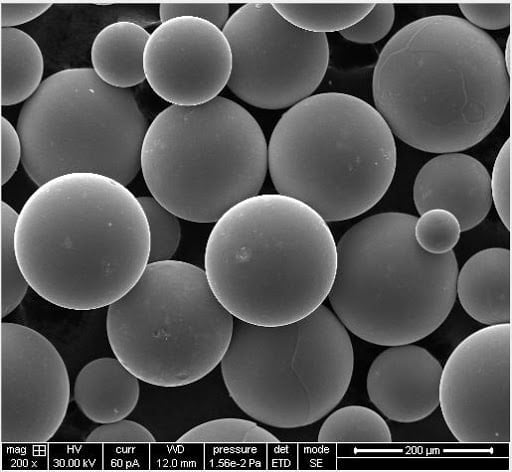
Applications of Spheroidising Powder
Spheroidising powders find applications in a wide range of industries due to their enhanced properties. Here are some common applications:
| Ngành | Ứng dụng | Preferred Metal Powder |
|---|---|---|
| Hiệp công | Aircraft components, engine parts | Titanium Alloy Powder |
| Y học | Implants, surgical instruments | Cobalt-Chrome Powder |
| Ô tô | Engine parts, lightweight structures | Aluminum Alloy Powder |
| Điện tử | Conductive components, connectors | Copper Powder |
| Sản xuất | Additive manufacturing, 3D printing | Stainless Steel Powder |
| Công cụ | Cutting tools, wear-resistant surfaces | Tungsten Carbide Powder |
| Năng lượng | Battery components, galvanizing | Zinc Powder |
Specifications, Sizes, Grades, and Standards
Spheroidising powders come in various specifications, sizes, grades, and standards to meet the specific requirements of different industries. Here is a detailed table showcasing these parameters:
| Metal Powder | Size Range (µm) | Grades | Tiêu chuẩn |
|---|---|---|---|
| Titanium Alloy Powder | 15-45, 45-106 | Grade 5, Grade 23 | ASTM F136, ASTM B348 |
| Stainless Steel Powder | 10-50, 50-150 | 316L, 304L | ASTM A240, ASTM F138 |
| Aluminum Alloy Powder | 20-63, 63-125 | AlSi10Mg, 6061 | ASTM B209, ASTM F3318 |
| Copper Powder | 5-50, 50-100 | C11000, C10100 | ASTM B170, ASTM B187 |
| Nickel Alloy Powder | 10-45, 45-150 | Inconel 625, 718 | ASTM B443, ASTM B637 |
| Cobalt-Chrome Powder | 15-45, 45-106 | CoCrMo, CoCrW | ASTM F75, ASTM F799 |
| Iron Powder | 10-100 | Fe-C, Fe-P | ASTM B213, ASTM B783 |
| Tungsten Carbide Powder | 1-10, 10-50 | WC-Co, WC-Ni | ASTM B777, ISO 4499 |
| Magnesium Alloy Powder | 20-100 | AZ91D, WE43 | ASTM B403, ASTM B557 |
| Zinc Powder | 5-45, 45-150 | Zn 99.9, Zn 99.95 | ASTM B6, ASTM B669 |
Suppliers and Pricing Details
Knowing where to source high-quality spheroidising powders and understanding the pricing can help in budgeting and procurement. Here is a table listing some of the top suppliers and pricing details:
| Nhà cung cấp | Metal Powder Models Available | Average Price (per kg) |
|---|---|---|
| Advanced Powders | Titanium Alloy, Stainless Steel, Aluminum Alloy | $80 – $150 |
| Metal Powders USA | Copper, Nickel Alloy, Iron | $40 – $120 |
| Global Metal Supply | Cobalt-Chrome, Tungsten Carbide, Zinc | $60 – $200 |
| PowderTech Solutions | Magnesium Alloy, Stainless Steel, Copper | $50 – $130 |
| 3D Materials Inc. | Aluminum Alloy, Nickel Alloy, Titanium Alloy | $70 – $160 |
Pros and Cons of Spheroidising Powder
Understanding the advantages and limitations of spheroidising powders is crucial for making informed decisions. Here’s a comparative table:
| Metal Powder | Lợi ích | Hạn chế |
|---|---|---|
| Titanium Alloy Powder | High strength, lightweight, corrosion-resistant | Expensive, difficult to machine |
| Stainless Steel Powder | Corrosion-resistant, good mechanical properties | Heavier compared to aluminum and titanium |
| Aluminum Alloy Powder | Lightweight, high thermal conductivity | Lower strength compared to titanium and steel |
| Copper Powder | Excellent electrical conductivity, high ductility | Prone to oxidation, relatively expensive |
| Nickel Alloy Powder | High strength, oxidation-resistant | High cost, difficult to machine |
| Cobalt-Chrome Powder | High wear resistance, biocompatible | Expensive, challenging to process |
| Iron Powder | Cost-effective, good mechanical properties | Prone to corrosion, lower performance in harsh environments |
| Tungsten Carbide Powder | Extremely hard, wear-resistant | Very dense, difficult to process |
| Magnesium Alloy Powder | Lightweight, good machinability | Flammable, prone to corrosion |
| Zinc Powder | Good corrosion resistance, galvanizing properties | Lower strength, limited high-temperature applications |

Câu hỏi thường gặp
Below are some common questions about spheroidising powder and their answers:
| Question | Answer |
|---|---|
| What is spheroidising powder? | Spheroidising powder consists of metal powders that have been transformed into spherical particles to improve their properties. |
| What are the benefits of using spheroidising powder? | Improved flowability, packing density, mechanical properties, and surface finish of metal components. |
| Which industries use spheroidising powder? | Aerospace, medical, automotive, electronics, manufacturing, tooling, and energy industries. |
| How is spheroidising powder made? | Through processes such as atomization, plasma rotating electrode process, or gas phase synthesis. |
| What are the common types of spheroidising powders? | Titanium alloy, stainless steel, aluminum alloy, copper, nickel alloy, cobalt-chrome, iron, tungsten carbide, magnesium alloy, and zinc powders. |
| How do I choose the right spheroidising powder? | Consider the specific requirements of your application, including properties, composition, and cost. |
| Where can I buy spheroidising powder? | From suppliers such as Advanced Powders, Metal Powders USA, Global Metal Supply, PowderTech Solutions, and 3D Materials Inc. |
Kết luận
Spheroidising powder is a vital material in modern manufacturing and metallurgy, offering enhanced properties that make it suitable for a wide range of applications. By understanding the different types, compositions, properties, and uses of these powders, manufacturers can make informed decisions to optimize their production processes and product quality.
Whether you are involved in aerospace, medical, automotive, electronics, or any other industry that relies on high-quality metal components, spheroidising powder can significantly contribute to the efficiency and performance of your products.
About 3DP mETAL
Product Category
LIÊN HỆ
Bạn có thắc mắc không? Hãy gửi tin nhắn ngay cho chúng tôi! Sau khi nhận được tin nhắn của bạn, chúng tôi sẽ xử lý yêu cầu của bạn với cả một đội ngũ.
